Past the Peak?!? That Was Weeks Ago
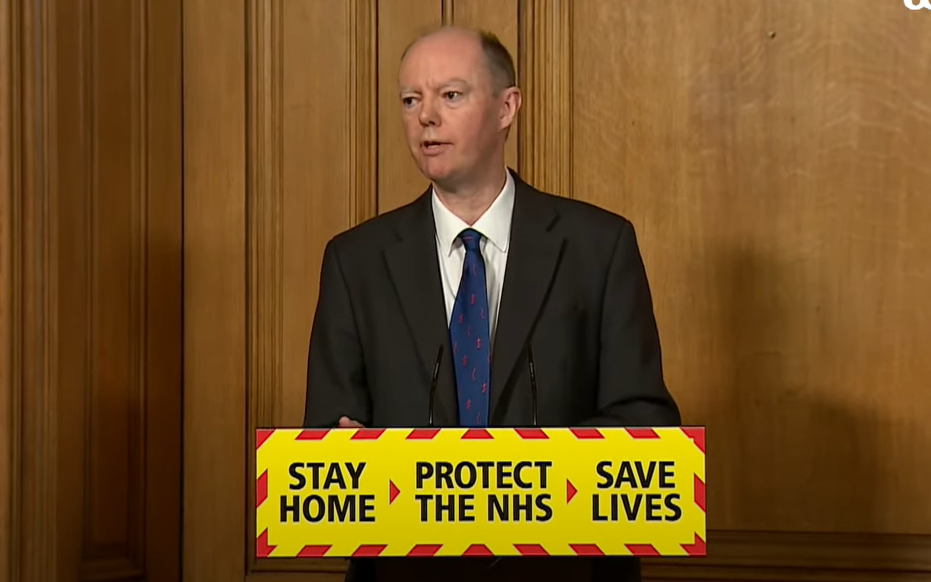
Chief Medical Adviser Professor Chris Whitty told the Downing Street coronavirus press conference yesterday that the UK is “past the peak” of the current wave. The BBC has the details.
The UK is “past the peak” of the current wave of the pandemic but infection rates are still high, England’s Chief Medical Officer says.
Prof Chris Whitty said the number of cases, hospitalisations and deaths were on a “downward slope” but that did not mean there would not be another peak.
Boris Johnson praised the “colossal” effort to vaccinate 10 million people, including 90% of those aged over 75. But he said the NHS was still under “huge pressure”.
Speaking at a Downing Street briefing, Prof Whitty said while the number of people in hospital with COVID-19 had reduced “quite noticeably”, it was still above that of the first peak in April 2020. “So this is still a very major problem, but it is one that is heading the right way,” he said.
Prof Whitty said infection rates were “coming down but they are still incredibly high”. If the rate was to increase again “from the very high levels we are at the moment the NHS will get back into trouble extraordinarily fast”, he added.
Chris Whitty seems a little late to the party here. Data from the ZOE Covid Symptom App show infections in the UK peaked over three weeks ago, on January 12th, and are now well on the way down.
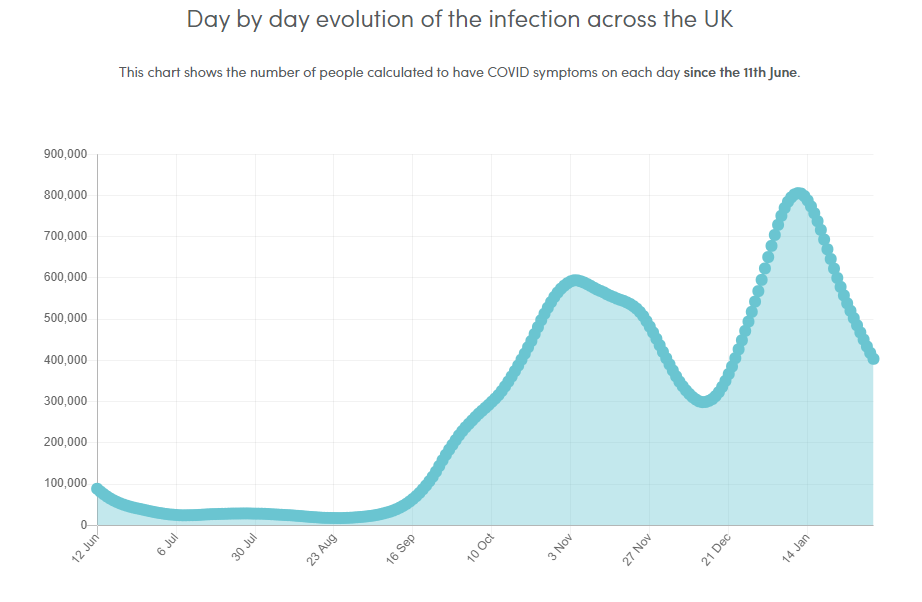
New daily infections peaked in the first few days of January.
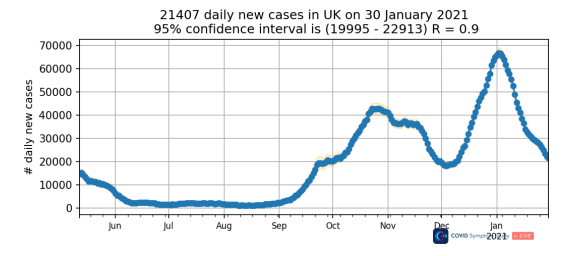
In London, it was the end of December.
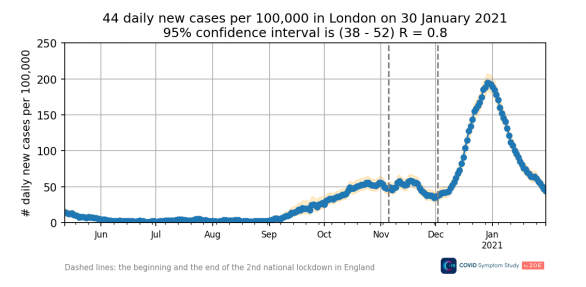
The decline continues apace, headed down towards levels not seen since September.
111 Covid triage data agrees.
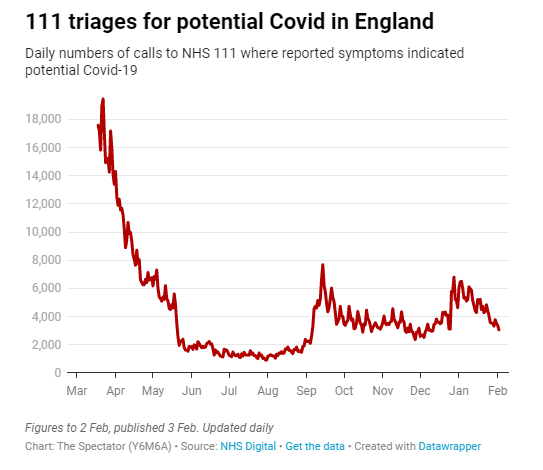
The peak in the triage data is December 28th. As of February 4th, then, we’re a long way “past the peak”.
Yet despite this clear evidence that the peak and decline in infections kicked in well before the start of the January lockdown, the Government and its advisers continue to assert that it is only the restrictions keeping infections down. This explains why Boris continues to take the go-slow approach to opening up, despite the immense and permanent harm restrictions cause to children, jobs, mental health and so on.
Despite coming under pressure to join Scotland and Wales in opening schools sooner than March, the Prime Minister yesterday reiterated his original schedule, saying he “hoped” schools in England would be able to “begin” reopening from March 8th, and that the Government would outline a “route map” out of lockdown on February 22nd.
Yet the idea that it is Government restrictions that are keeping the virus at bay grows more implausible by the day.
Take a look at the graph below, which shows that the decline in infections from around January 12th kicked in not just in the UK but right across the world, regardless of what non-pharmaceutical interventions governments made or the stage of their vaccination programmes.
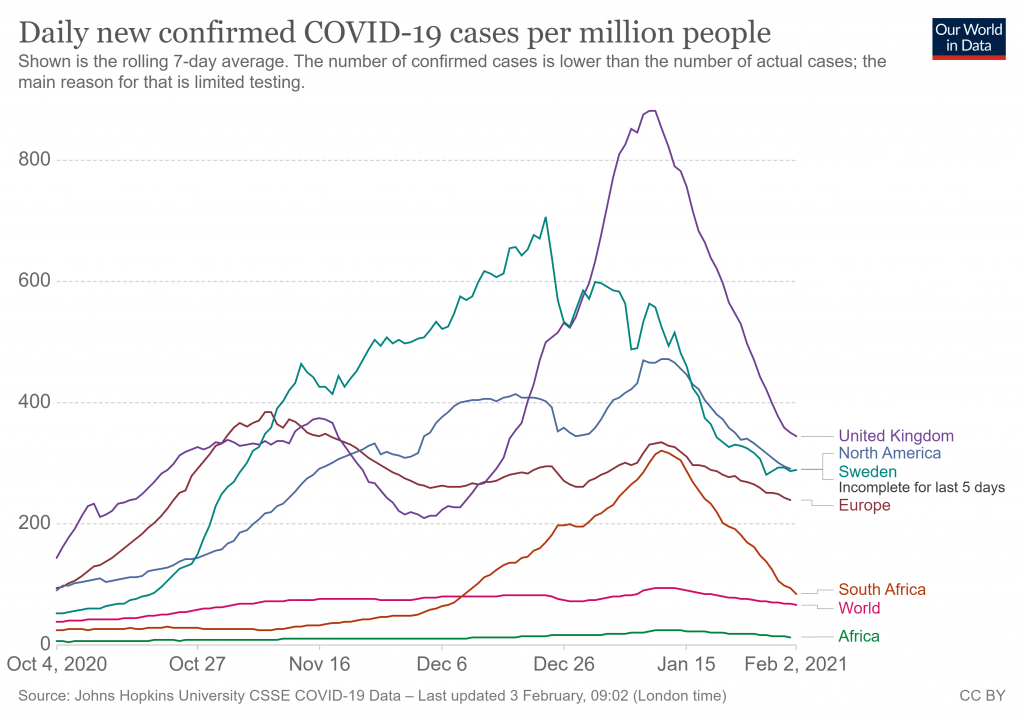
While not every country in the world conforms to this pattern, enough do for it to be seen as a global phenomenon. There is no indication here that the UK and South African variants are prolonging the crisis in those countries.
Why the winter (and in some places like South Africa, summer) epidemic went into decline around the same point in mid-January in countries all round the world is not entirely clear, though is likely to be linked to the progress of immunity in the population.
Yet more evidence that it is not primarily human interventions that drive the ebb and flow of this virus.
Stop Press: The Mail has picked up on the global drop, asking “Why ARE coronavirus cases plummeting? New infections have fallen 44% in the US and 30% globally in the past three weeks and experts say vaccine is NOT the main driver because only 8% of Americans and 13% people worldwide have received their first dose“. The main explanation offered by “officials” is population immunity. Another suggestion is the end of the so-called Christmas surge – though even the BBC has pointed out there is no evidence for this idea.
Why Hand Sanitisers Do More Harm Than Good

We’re publishing today a new piece by regular contributor and medical historian Dr Irina Metzler questioning the public health wisdom of all this obsessive germ blitzing. Here’s a taster.
Hand sanitisers, or hand satanisers as I prefer to dyslexise, are as ubiquitous a part of the pandemic as the masks. Unlike the masks, which will cause mainly individual problems (if you wear a mask, you’re restricting your own breathing, not someone else’s), hand sanitiser use at the level we’ve been seeing for the past 10 months is going to become one helluva headache in the none too distant future. That’s because apart from destroying your own, personal microbiome we’ve got a bigger picture to consider.
Antimicrobial resistance across the board had been getting worse already before the pandemic hit. Already in 2018 it was noted that alcohol-based hand sanitisers in particular were turning bacteria into the next level of ‘superbug’, namely VRE (vancomycin resistant enterococci), one of the leading causes of infections in hospitals.
“We have to be careful about this new trend towards heavy reliance on alcohol-based hand sanitisers. Soap and water should be our number-one protection” – both in hospitals and for personal use. The next question is whether the bacteria will continue to evolve and tolerate higher and higher doses of alcohol – or even stop responding entirely. “Is it possible for these organisms to develop complete resistance to alcohol?” These questions were also raised by researchers years before the advent of SARS-CoV-2 and the ubiquitous little bottles of hand gels.
It has a permanent place on our right-hand menu. Worth reading in full.
The Government is Gambling With People’s Lives

In a new piece that we’re publishing today, philosopher Ben Hawkins takes a look at lockdown through the lens of the “trolley problem”. What should you do when faced with a peril for which you are not personally responsible – what is it acceptable for you to sacrifice to try to avert it? Ben explains:
Imagine you are walking across a bridge over a rail line. Suddenly you hear screams coming from under the bridge. You look down and see that four people are tied to the tracks. What’s worse, you look up and see what looks like a runaway train carriage hurtling towards them. The carriage doesn’t look that big – if you could push a large object over the bridge in front of the carriage, you figure that it would be enough to stop the carriage and save the four people tied to the line. Looking around for such an object, you see an incredibly fat man stood at the edge of the bridge. He looks big enough to stop the carriage. Do you push him, knowing that falling from such a height and being hit by the carriage will almost certainly kill him? Do you sacrifice one life, to save four others?
This is an example of a trolley problem, a hypothetical scenario designed by ethicists to examine how we should behave in different situations. The above example is tricky, because whilst we would usually agree that four lives are more important than one life, the positive act of killing someone goes against many of our moral intuitions. Most people, when asked what they would do in this scenario, say they wouldn’t push the fat man.
Such abstract scenarios may seem irrelevant to real life. We certainly never expect to find ourselves in situations like the one described above – we don’t live in a world where people are frequently tied to train tracks, or where runaway train carriages can be stopped by pushing fat men off bridges. But the point isn’t to understand how we would behave in this particular situation, but to understand how we should behave when analogous situations arise in real life. And, in fact, we have such a real life situation to which such considerations can be applied. Lockdown.
Worth reading in full.
Why Face Masks Don’t Protect the Wearer

“Why Face Masks Don’t Work: A Revealing Review of Their Inadequacies” is the title, not as you might think of a recent article by a lockdown sceptic, but a piece written in 2016 by dentist John Hardie in Oral Health magazine. He begins:
For at least three decades a face mask has been deemed an essential component of the personal protective equipment worn by dental personnel. A current article, “Face Mask Performance: Are You Protected” gives the impression that masks are capable of providing an acceptable level of protection from airborne pathogens. Studies of recent diseases such as Severe Acute Respiratory Syndrome (SARS), Middle Eastern Respiratory Syndrome (MERS) and the Ebola Crisis combined with those of seasonal influenza and drug resistant tuberculosis have promoted a better understanding of how respiratory diseases are transmitted. Concurrently, with this appreciation, there have been a number of clinical investigations into the efficacy of protective devices such as face masks. This article will describe how the findings of such studies lead to a rethinking of the benefits of wearing a mask during the practice of dentistry. It will begin by describing new concepts relating to infection control especially personal protective equipment (PPE).
Hardie concludes:
The primary reason for mandating the wearing of face masks is to protect dental personnel from airborne pathogens. This review has established that face masks are incapable of providing such a level of protection. Unless the Centers for Disease Control and Prevention, national and provincial dental associations and regulatory agencies publicly admit this fact, they will be guilty of perpetuating a myth which will be a disservice to the dental profession and its patients.
It would be beneficial if, as a consequence of the review, all present infection control recommendations were subjected to the same rigorous testing as any new clinical intervention. Professional associations and governing bodies must ensure the clinical efficacy of quality improvement procedures prior to them being mandated. It is heartening to know that such a trend is gaining a momentum which might reveal the inadequacies of other long held dental infection control assumptions.
Prescient, you might think, and depressing that these lessons, of the need for rigorous testing of infection control measures and of the ineffectiveness of masks, were not learned.
Too prescient, it seems. For this article has been taken down from the publisher’s website, with just a note left in its place.
If you are looking for “Why Face Masks Don’t Work: A Revealing Review” by John Hardie, BDS, MSc, PhD, FRCDC, it has been removed. The content was published in 2016 and is no longer relevant in our current climate.
Please note that the content from Oral Health Group is primarily intended to educate and inform dental professionals.
Censorship and erasure of the past to try to shore up the flimsy case for face masks. Not exactly a sign of confidence in the evidence.
Lockdown Sceptics is pleased to make the article available to the public again. You can find it here.
SAGE Admits Masks Do Little to Help

SAGE quietly released a document on January 13th which admits that masks are no protection for the wearer, and though intended to protect others aren’t even very good at that. An independent researcher has taken a closer look for Lockdown Sceptics and explains further.
SAGE released a document in January prepared by a sub-committee, which it endorsed, saying that masks were primarily a source control (cloth and surgical masks are thought to offer the wearer little protection) and citing an estimate for their typical impact on transmission of 6-15% (possibly as high as 45%).
That document says in relation to source control: “Analysis of regional level data in several countries suggest this impact is typically around 6 – 15% (Cowling and Leung, 2020, Public Health England 2021) but could be as high as 45% (Mitze et al., 2020).”
A 6 – 15% reduction seems to be a lot lower than NERVTAG, SAGE and the Government have previously suggested – barely relevant. Moreover, the Cowling & Leung paper says: “While most research on face masks has involved surgical type face masks, it should be presumed that reusable cloth masks could provide similar benefits if they have a sufficient number of layers and preferably a filter.” So the 6 – 15% estimate seems to be for surgical masks. Cloth masks in reality usually have few layers (maybe only one) and no filter. So their effect is likely smaller still.
The Cowling & Leung paper is here. It is an editorial not a research paper in its own right.
The 6 – 15% estimate actually comes from a December 2020 review paper by Brainard et al.
They say: “Conclusion: Wearing face masks may reduce primary respiratory infection risk, probably by 6-15%. It is important to balance evidence from RCTs and observational studies when their conclusions widely differ and both are at risk of significant bias. COVID-19-specific studies are required.” They also say “The environmental and economic costs of regularly using face masks are notable, and only partly abated by reuse.”
Not exactly strong support for wearing masks!
Round-up
- “Capt Tom donations: What was the £33m spent on?” – BBC report explaining it went on snacks, tea breaks and a “well-being wing” for hospital staff. Perhaps some more ICU nurses might have been a better buy…
- “What the latest vaccine news means for lifting lockdown” – Kate Andrews in the Spectator writes that Government worries over ICU occupancy among the under-65s are keeping the brakes on the lockdown easing
- “Rishi Sunak concerned scientists are ‘moving goalposts’ on Covid lockdown” – Camilla Tominey in the Telegraph on the battle within Government to prioritise opening up over eliminating all risk
- “COVID-19 rarely spreads through surfaces. So why are we still deep cleaning?” – Nature feature by Dyani Lewis querying another Covid myth
- “No Hugging, No Kissing” – Latest episode of the GoodFellows podcast from the Hoover Institute where GBD co-author Professor Jay Bhattacharya joins John H. Cochrane, Niall Ferguson, H.R. McMaster and Bill Whalen to talk Covid and the future
- “Immunity & COVID-19” – New briefing note from the British Society for Immunology that is worth bookmarking
- “The Pandemic That Changed Nothing” – Left wing criticism of lockdown policy by Leila Mechoui and Alexander Davidson on the Bellows for how it penalises workers and benefits the wealthy
- “Move over, Dictator Dan: Marshal Mark is the new laughable Lord of the Lockdown” – Rocco Loiacono in Spectator Australia on the new tyrant in town
- “Coronavirus: no going back to normal” – Disturbing report from the Institute for Government by Bronwen Maddox arguing that “life after coronavirus will not feel like life before. It is best that Governments acknowledge that and start planning now… while not raising expectations that life will suddenly snap back to an almost forgotten normal”
- “Gab Lockdown Sceptics” – Join the new group here
- “Covid-19 pandemic causes a global democracy slump” – The 2020 edition of the Economist‘s Democracy Index finds the average global score fell from 5.44 to 5.37 – the worst score since the index began in 2006. And still pretty generous I would say
- “HS2 contractors to use social distancing hard hats” – Report from Construction Enquirer that a contractor on the project is to issue workers with hard hats that sound an alarm if they get too near each other
- “Understanding the drivers of transmission of SARS-CoV-2” – Comment piece in the Lancet by Laura Cornelissen and Emmanuel André expounding a study that confirms infectiousness is predicted by viral load and thus asymptomatic infection is not a major driver of transmission. They also note (with a hint of embarrassment) that mask-wearing has no relationship to risk of transmission
- “Californians Disapprove of Gov. Lockdown” – James Freeman in the Wall Street Journal on a new survey that indicates why Governor Gavin Newsom is now trying to reopen fast
- “Northern Ireland NHS cancels 4,000+ red flag cancer patients” – BBC reports on yet more collateral damage from the anti-Covid measures
- “No evidence of change in symptoms from new coronavirus variant” – Report from King’s College London drawing on ZOE app data confirming there are no significant differences in symptoms, severity or duration of disease from the Kentish variant
- “Dear Captain Tom: Rest in peace – not applause” – Emily Hill says he deserves more respect than this virtue signalling festival
- “UK seeing a ‘lack of appetite’ for regaining freedoms” – Brendan O’Neill tells Sky News Australia host Chris Kenny he’s worried about the “unwillingness of society to say ‘listen freedom is important and we need an actual date for when it’s going to be returned to us’”
Theme Tunes Suggested by Readers
Eight today: “Don’t stop thinking about tomorrow” by Fleetwood Mac, “Strange Days” by the Doors, “Strange Town” by the Jam, “Ghost Town” by The Specials, “Enough is enough” by Donna Summer/Barbara Streisand, “What a fool believes” by Doobie brothers, “Know Your Rights” by The Clash and “Where Did All The Good Times Go” by Donnie Osmond.
Love in the Time of Covid

We have created some Lockdown Sceptics Forums, including a dating forum called “Love in a Covid Climate” that has attracted a bit of attention. We have a team of moderators in place to remove spam and deal with the trolls, but sometimes it takes a little while so please bear with us. You have to register to use the Forums as well as post comments below the line, but that should just be a one-time thing. Any problems, email Lockdown Sceptics here.
Sharing Stories
Some of you have asked how to link to particular stories on Lockdown Sceptics so you can share it. To do that, click on the headline of a particular story and a link symbol will appear on the right-hand side of the headline. Click on the link and the URL of your page will switch to the URL of that particular story. You can then copy that URL and either email it to your friends or post it on social media. Please do share the stories.
Social Media Accounts
You can follow Lockdown Sceptics on our social media accounts which are updated throughout the day. To follow us on Facebook, click here; to follow us on Twitter, click here; to follow us on Instagram, click here; to follow us on Parler, click here; and to follow us on MeWe, click here.
“Mask Exempt” Lanyards

We’ve created a one-stop shop down here for people who want to obtain a “Mask Exempt” lanyard/card – because wearing a mask causes them “severe distress”, for instance. You can print out and laminate a fairly standard one for free here and the Government has instructions on how to download an official “Mask Exempt” notice to put on your phone here. And if you feel obliged to wear a mask but want to signal your disapproval of having to do so, you can get a “sexy world” mask with the Swedish flag on it here.
A reader has started a website that contains some useful guidance about how you can claim legal exemption. Another reader has created an Android app which displays “I am exempt from wearing a face mask” on your phone. Only 99p.
If you’re a shop owner and you want to let your customers know you will not be insisting on face masks or asking them what their reasons for exemption are, you can download a friendly sign to stick in your window here.
And here’s an excellent piece about the ineffectiveness of masks by a Roger W. Koops, who has a doctorate in organic chemistry. See also the Swiss Doctor’s thorough review of the scientific evidence here and Prof Carl Heneghan and Dr Tom Jefferson’s Spectator article about the Danish mask study here.
Stop Press: The US Federal Government is stepping up its mask requirements with new, stricter rules on public transport – which in America includes giving someone a lift. Breitbart News has the details.
The Centers for Disease Control and Prevention’s (CDC) latest order, requiring individuals to wear masks when using public transportation or residing in transportation hubs, will be “further enforced by other federal authorities”, the agency announced in its order, which went into effect this week.
Under the order, individuals are required to wear masks while using public transportation, which includes “awaiting, boarding, disembarking, or traveling on airplanes, ships, ferries, trains, subways, buses, taxis, and ride-shares as they are traveling into, within, or out of the United States and U.S. territories”, per the CDC.
There are exemptions, but they are not generous, and notably children of three and up do not escape.
The order exempts those under the age of two, as well as individuals with certain disabilities. Individuals are also not required to wear a mask while eating or drinking “for brief periods of time” or communicating “for brief periods of time” with someone who is hearing impaired.
The CDC also specifies that individuals do not have to wear a mask if unconscious “for reasons other than sleeping”, or if they are “incapacitated, unable to be awakened, or otherwise unable to remove the mask without assistance”.
The order also permits those who are “experiencing difficulty breathing or shortness of breath or are feeling winded” to remove the mask “temporarily until able to resume normal breathing with the mask”.
“Persons who are vomiting should remove the mask until vomiting ceases,” the order states.
The Great Barrington Declaration

The Great Barrington Declaration, a petition started by Professor Martin Kulldorff, Professor Sunetra Gupta and Professor Jay Bhattacharya calling for a strategy of “Focused Protection” (protect the elderly and the vulnerable and let everyone else get on with life), was launched in October and the lockdown zealots have been doing their best to discredit it ever since. If you googled it a week after launch, the top hits were three smear pieces from the Guardian, including: “Herd immunity letter signed by fake experts including ‘Dr Johnny Bananas’.” (Freddie Sayers at UnHerd warned us about this the day before it appeared.) On the bright side, Google UK has stopped shadow banning it, so the actual Declaration now tops the search results – and Toby’s Spectator piece about the attempt to suppress it is among the top hits – although discussion of it has been censored by Reddit. The reason the zealots hate it, of course, is that it gives the lie to their claim that “the science” only supports their strategy. These three scientists are every bit as eminent – more eminent – than the pro-lockdown fanatics so expect no let up in the attacks. (Wikipedia has also done a smear job.)
You can find it here. Please sign it. Now over three quarters of a million signatures.
Update: The authors of the GBD have expanded the FAQs to deal with some of the arguments and smears that have been made against their proposal. Worth reading in full.
Update 2: Many of the signatories of the Great Barrington Declaration are involved with new UK anti-lockdown campaign Recovery. Find out more and join here.
Update 3: You can watch Sunetra Gupta set out the case for “Focused Protection” here and Jay Bhattacharya make it here.
Update 4: The three GBD authors plus Prof Carl Heneghan of CEBM have launched a new website collateralglobal.org, “a global repository for research into the collateral effects of the COVID-19 lockdown measures”. Follow Collateral Global on Twitter here. Sign up to the newsletter here.
Judicial Reviews Against the Government

There are now so many legal cases being brought against the Government and its ministers we thought we’d include them all in one place down here.
The Simon Dolan case has now reached the end of the road. The current lead case is the Robin Tilbrook case which challenges whether the Lockdown Regulations are constitutional. You can read about that and contribute here.
Then there’s John’s Campaign which is focused specifically on care homes. Find out more about that here.
There’s the GoodLawProject and Runnymede Trust’s Judicial Review of the Government’s award of lucrative PPE contracts to various private companies. You can find out more about that here and contribute to the crowdfunder here.
Scottish Church leaders from a range of Christian denominations have launched legal action, supported by the Christian Legal Centre against the Scottish Government’s attempt to close churches in Scotland for the first time since the the Stuart kings in the 17th century. The church leaders emphasised it is a disproportionate step, and one which has serious implications for freedom of religion.” Further information available here.
There’s the class action lawsuit being brought by Dr Reiner Fuellmich and his team in various countries against “the manufacturers and sellers of the defective product, PCR tests”. Dr Fuellmich explains the lawsuit in this video. Dr Fuellmich has also served cease and desist papers on Professor Christian Drosten, co-author of the Corman-Drosten paper which was the first and WHO-recommended PCR protocol for detection of SARS-CoV-2. That paper, which was pivotal to the roll out of mass PCR testing, was submitted to the journal Eurosurveillance on January 21st and accepted following peer review on January 22nd. The paper has been critically reviewed here by Pieter Borger and colleagues, who have also submitted a retraction request.
And last but not least there was the Free Speech Union‘s challenge to Ofcom over its ‘coronavirus guidance’. A High Court judge refused permission for the FSU’s judicial review on December 9th and the FSU has decided not to appeal the decision because Ofcom has conceded most of the points it was making. Check here for details.
Samaritans

If you are struggling to cope, please call Samaritans for free on 116 123 (UK and ROI), email jo@samaritans.org or visit the Samaritans website to find details of your nearest branch. Samaritans is available round the clock, every single day of the year, providing a safe place for anyone struggling to cope, whoever they are, however they feel, whatever life has done to them.
Shameless Begging Bit
Thanks as always to those of you who made a donation in the past 24 hours to pay for the upkeep of this site. Doing these daily updates is hard work (although we have help from lots of people, mainly in the form of readers sending us stories and links). If you feel like donating, please click here. And if you want to flag up any stories or links we should include in future updates, email us here. (Don’t assume we’ll pick them up in the comments.)
And Finally…




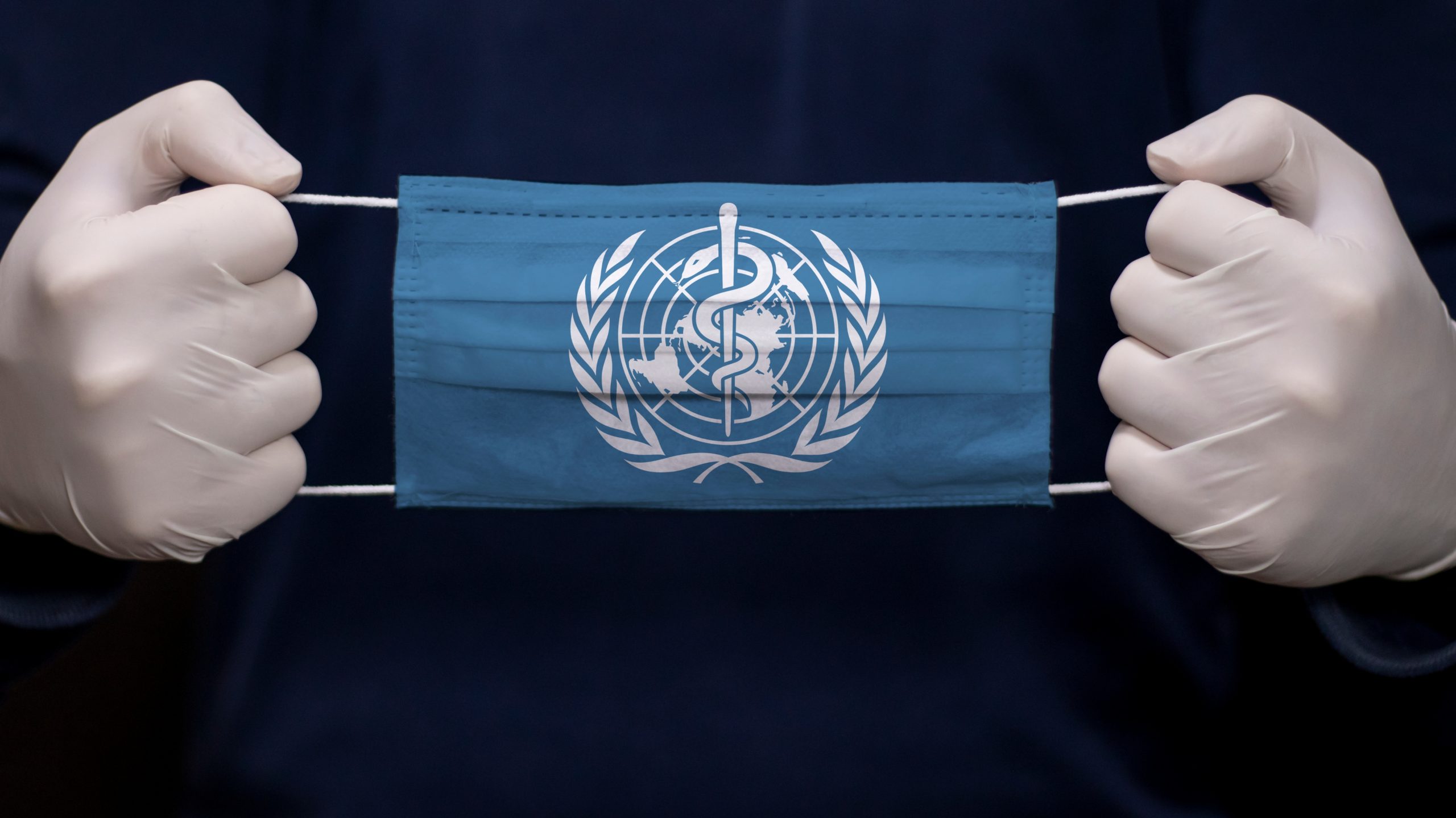






To join in with the discussion please make a donation to The Daily Sceptic.
Profanity and abuse will be removed and may lead to a permanent ban.